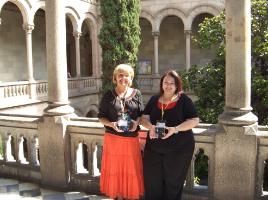'Students in Custody' report a world beater
Published on 03 September, 2009
A CQUniversity research report about the 'Education Journeys from Australian Indigenous Students in Custody' has gained an International Award for Excellence in the area of Literacy and Education.
Rockhampton Campus lecturers Vicki Pascoe and Kylie Radel have recently returned from the 16th International Learning Conference in Barcelona, Spain, where they presented a plenary session and collected their award.

Vicki Pascoe (left) and Kylie Radel in Barcelona where they accepted their award
Common Ground Publishing representative Professor Bill Cope presented the award after an international advisory board considered all papers submitted for Common Ground's Learning Journal.
The paper was selected from the 10 highest-ranked papers emerging from the referee process.
Ms Pascoe is the Acting Co-Director at CQUniversity's Nulloo Yumbah (Indigenous Centre) and Kylie Radel is based in the School of Commerce and Marketing.
The winning paper is based on the duo's research under the full title: "What are Nice Guys Like them doing in a Place Like that?": Education Journeys from Australian Indigenous Students in Custody.
"Our paper is based on a qualitative research study which explored the education journeys of 6 of our Indigenous CQUniversity students," the academics said.
"Our students represent a fragile equity group, that of Australian Indigenous men in custody. Against the exploration of education journeys, we critically access the possibility of transformational emancipatory education dimensions."
The findings include:
- Most of our participants began their institutionalisation in ‘boys' homes prior to entering adult prison
- All participants were from low socio-economic backgrounds
- All had experienced disrupted home and education environments
- Most participants experienced violence in the home
- Participants expressed high aspirations for family and community, not necessarily for themselves
- All but one participant expressed feelings of education failure
- Motivations to study are not necessarily linked to learning
"Our findings demonstrate that transformational emancipatory education in a prison context is impeded by past education experiences, a restrictive environment and a self-depreciation spiral," the academics said.

